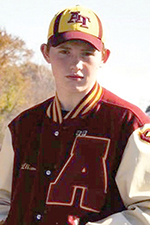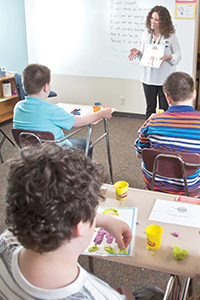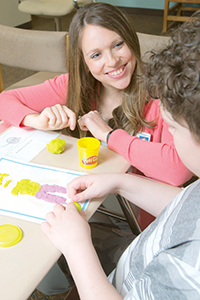By BETSY TAYLOR
When Lliam Rosencrans was in elementary school he'd sometimes get so angry he felt like he might explode. He learned quickly in the classroom, but had trouble making friends. When he got frustrated he'd lose his temper, even throwing desks. At home, he'd physically lash out at his parents, who tried a variety of ways to help him, initially to little avail.
He credits a specialized school program at St. Vincent Anderson Hospital in Anderson, Ind., near his Alexandria home, with helping him gain the skills he needed to manage his emotions and to police his own behavior. From February of 2012 to February of 2015, Rosencrans attended the Anderson Center Day School Program. Along with subjects like math and social studies, he learned how to recognize when he was struggling to stay calm, and what he needed to do to keep his cool. He mastered social skills that seemed to come more naturally to others.
Now 16, Rosencrans is a confident and engaged public high school student. He competes in track and field and other activities, including barrel racing with his Haflinger horse, Nutmeg. And if kids from his elementary school want to talk about the changes from his early behavior, which some of them still recall: "I'll gladly talk about it," he said.

Lliam Rosencrans, now 16, poses with Nutmeg after a 4-H-sponsored barrel racing competition in Indiana. As an elementary school student, Rosencrans experienced isolation and fits of rage. He learned temper control and relationship skills at the Anderson Center Day School Program at St. Vincent Anderson Hospital. He now is thriving in high school and in extracurricular activities.
Schooling at a hospital
The Anderson Center at St. Vincent Anderson Hospital provides outpatient behavioral health services for adults and inpatient and outpatient behavioral health services for adolescents.
The Anderson Center offers two programs at its on-site school: one for up to 15 students in its residential program, where the average length of stay is six months, and another for up to 15 students in the day school program. The two groups of students use the classroom space at separate times of the day and share a teacher.
About a decade ago, leaders with the area's public school system, Anderson Community Schools, determined the schools were struggling to meet the specialized needs of some of their students whose mental health or behavioral challenges made them ill-suited for a traditionally structured classroom. Because the hospital and public schools already had a partnership to educate students in the residential adolescent psych program — the school district provides the classroom teacher — they decided to work together to open a second program, the day school at the Anderson Center.

Lliam Rosencrans
The day school, which is open year round, is staffed by two licensed clinical social workers, a behavioral health counselor, a mental health assistant and a developmental assistant, who are St. Vincent Anderson Hospital employees. The school district employs the teacher for the nine-month school year, and the hospital employs the summer school teacher.
Children at the school range from age 8 to 18, though Marion Teixeira, executive director of the Anderson Center, said many of them are middle school age. They may be on the autism spectrum, have learning disabilities or other mental health conditions, or difficulty controlling their behavior. Depending on the child, school staff may focus on teaching interpersonal communication skills, techniques to manage intense feelings, conflict resolution strategies and self-esteem building.
Children can attend the day school for a few months, or a few years. In April, the program had six students.
Anchoring institution
It's uncommon to find day schools on a hospital campus, said Teixeira. This one provides vital services in an economically struggling region. She said in 1985, Anderson had a thriving auto industry and a population of about 75,000; the city had three high schools.

As she leads an art session at the day school, therapist Ashley Stangland stays alert to signs that a child may be becoming anxious or be in need of a break. Day school therapists work with students to develop coping and communication skills.
Courtesy of St. Vincent Anderson Hospital
Today, 79 percent of elementary school children qualify for free or reduced cost meals, and the city has just one high school as the population has fallen to about 55,000 residents. Mental health needs persist, with substance abuse and suicide among the region's pressing concerns.
When the Anderson day school gets a referral from the school district, staff meet with the child's parents or guardians and observe the child in the child's current classroom. The child's school applies to the state's education division to make the case that the center can best meet the child's needs.
The children who are referred are usually not functioning well in their current school environment. Teixeira offered the example of a student who would become overwhelmed at school, and bolt, literally running from the school.
The state pays the center $243 per student per school day, Teixeira said. The center supplements the day school's budget, funding equine therapy and field trips and some of the day-to-day expenses.
Adaptive curricula and chairs that wiggle
A school bus picks up the center's students on weekday mornings. At the center, school staff greet the students, and the students undergo a security check with handheld metal detectors. Backpacks get inspected too.
After breakfast, children study subjects tailored to their academic level; instruction often includes online learning.
Ashley Stangland, a day school therapist, said the overall environment at the school is "up tempo." Therapists spend time in the classroom, where they can introduce and reinforce anxiety reduction techniques or use behavior modification principles to reward students for making good choices.

Therapist Kelly Ricer spends one-on-one time with a 9-year-old boy making a Play-Doh portrait during class at the day school.
Courtesy of St. Vincent Anderson Hospital
She said staff get to know each child, and can often see when one of them is becoming agitated, or is having trouble focusing and needs a break. The center has a sensory room, monitored by a video camera, where students can go if they need a break. It includes beanbag chairs, which some children find soothing because the sack cocoons them; chairs that wiggle and large exercise balls, because some children struggle to sit still and need some time to move before they focus again. Manipulating putty and handheld fidgets can reduce stress and improve concentration.
Stangland said one of the skills she works with children on is self-regulation. That starts with self-awareness and the ability to identify how one is feeling in the moment and what one is about to do in reaction. Building on that mindfulness, a student can learn to stop and think: "What can I do instead of an outburst?"
Students learn how to manage their emotions when they return to a traditional classroom. Rosencrans, for instance, said he and his teachers agreed that when he feels overly anxious, he can leave a classroom for a few minutes and go talk to a particular educator who he works with to regain his composure before he returns to class.
Transitioning out
Therapists and teachers working with children and their parents set detailed goals for each child, and they work together toward those goals. Some children need to develop interpersonal skills; some need to acquire life skills that can be as fundamental as good hygiene practice or knowing how to do a load of wash.
Once children reach their goals, they transition back to a traditional school setting. Some spend half the day at the center and half at their school as they make the adjustment. Not all students reach all their goals. Teixeira estimates about 60 percent do. She said for many children their time at the Anderson day school results in significant social, behavioral and academic improvements.
Stangland said she loves when children or adolescents return to the day school and report that they're involved in their mainstream school and making new friends. "That's such a joy to see," she said.
Copyright © 2017 by the Catholic Health Association
of the United States
For reprint permission, contact Betty Crosby or call (314) 253-3490.